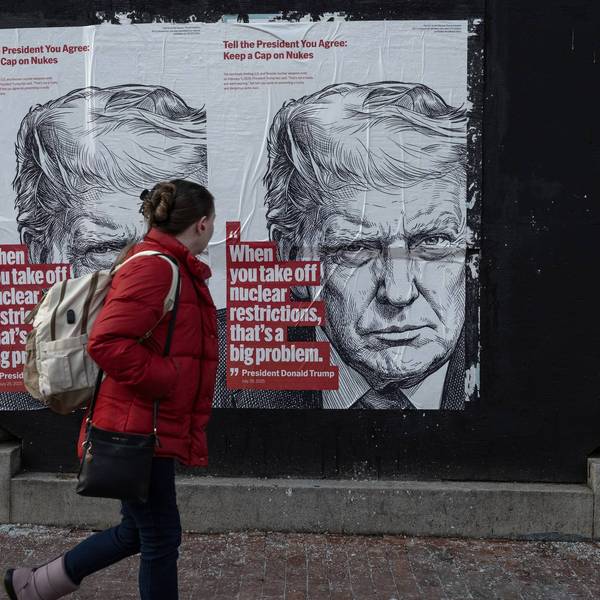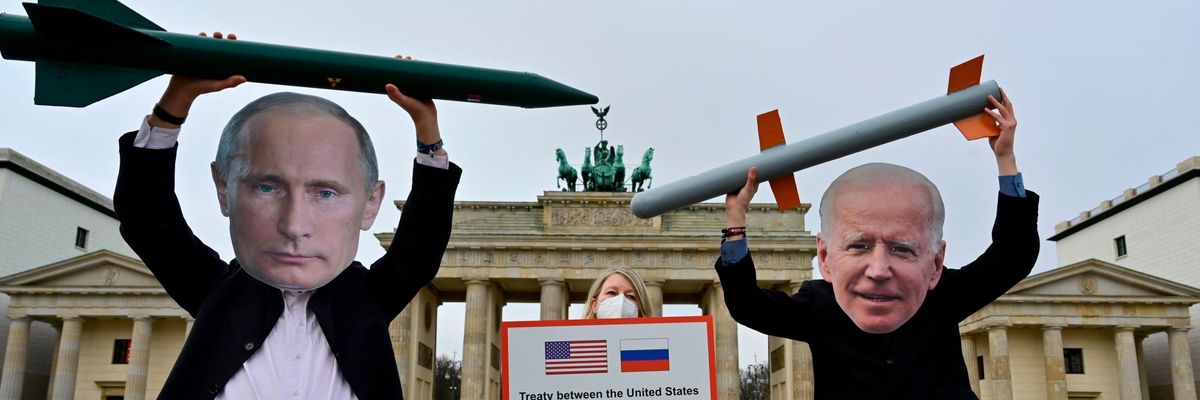In the wake of key meetings last month featuring leaders of three nations with nuclear weapons, global leadership groups on Tuesday urged the permanent members of the United Nations Security Council to jointly affirm that "a nuclear war cannot be won and must never be fought."
"The permanent five members of the United Nations Security Council have a particular responsibility to reduce the risks of nuclear war and uphold international peace and security."
--Leadership groups
"This principle is fundamental to ensuring predictability, reducing the risk of armed conflicts and the threat of nuclear war," the groups said. "It provides a foundation for progress to reduce existential common risks, including on the climate and global public health. It is especially important as new technologies reduce decision time for leaders."
Along with all of the U.N. Security Council's permanent five (P5) members--China, France, Russia, the United Kingdom, and the United States--four other countries are known to have nuclear weapons: India, Israel, North Korea, and Pakistan.
The principle at the center of the groups' demand was included in a June 16 joint statement from U.S. President Joe Biden and Russian President Vladimir Putin, echoing a 1985 agreement between former U.S. President Ronald Reagan and Soviet leader Mikhail Gorbachev.
On June 28, Putin and Chinese President Xi Jinping similarly said that they "are firmly convinced that nuclear war has no winners and should never be unleashed. Given the risks of nuclear escalation, we should also do our utmost to prevent any armed conflicts between any states with military nuclear capabilities."
The leadership groups welcomed the recent commitments from Biden, Putin, and Xi, and pointed out that the principle they are urging P5 nations to collectively recognize is "at the core of" the Treaty on the Nonproliferation of Nuclear Weapons (NPT).
The preamble of that treaty states that "the devastation that would be visited upon all mankind by a nuclear war and the consequent need to make every effort to avert the danger of such a war and to take measures to safeguard the security of peoples."
"The permanent five members of the United Nations Security Council have a particular responsibility to reduce the risks of nuclear war and uphold international peace and security, as the only nuclear weapons states recognized under the NPT," the groups said.
"We call on the P5 heads of government to jointly affirm this simple and powerful formula and provide a vital demonstration of leadership that would strengthen the NPT," they added. "We stand ready to support your efforts to move the world in a safer and more hopeful direction."
Signatories to Tuesday's call include co-conveners of the Euro-Atlantic Security Leadership Group: Des Browne of Nuclear Threat Initiative (NTI) and European Leadership Network (ELN); Wolfgang Ischinger of the Munich Security Conference Foundation; Igor Ivanov of the Russian International Affairs Council; and NTI co-chairs Ernest J. Moniz and Sam Nunn.
Additional signatories include ELN director Adam Thomson; the Elders chair Mary Robinson; and Gareth Evans and Shata Shetty, who respectively serve as chair and executive director of the Asia-Pacific Leadership Network.
Their demand directed at P5 countries comes amid frustrations among campaigners that leaders of nuclear-armed nations haven't gone further in their commitments to promoting global peace and security.
Following Biden and Putin's summit, anti-nuclear activists expressed disappointment that neither leader pledged to reduce their countries' arsenals.
Beatrice Fihn, executive director of International Campaign to Abolish Nuclear Weapons (ICAN), said at the time that "we need to see actual disarmament progress from the countries with the world's largest nuclear arsenals."
Fihn highlighted public opinion worldwide as well as the Treaty on the Prohibition of Nuclear Weapons, which entered into force this year without support from the U.S. or Russian governments. ICAN won the 2017 Nobel Peace Prize for its campaigning that included raising support for the treaty.
In an opinion piece for Common Dreams following the Biden-Putin summit last month, Robert Dodge, who co-chairs Physicians for Social Responsibility's Nuclear Weapons Abolition Committee, also pointed to the new treaty, declaring that "the international community has spoken."
"The complete abolition of nuclear weapons is the only way to be safe from their threat," Dodge argued. "Knowing this, and the reality that nuclear weapons are far more dangerous than we had ever realized, it is essential that you, as leaders of the two nations with the largest nuclear arsenals, explain to the world when and under what circumstances you would even consider using these weapons that risk ending humanity and life as we know it."
"When it comes to the risk of nuclear war, a child born today has a significant chance of experiencing a nuclear war with the potential destruction of civilization in their lifetime unless you take the steps now to prevent it," he added. "Absent these steps, one must ask if this is the legacy you want to leave."




